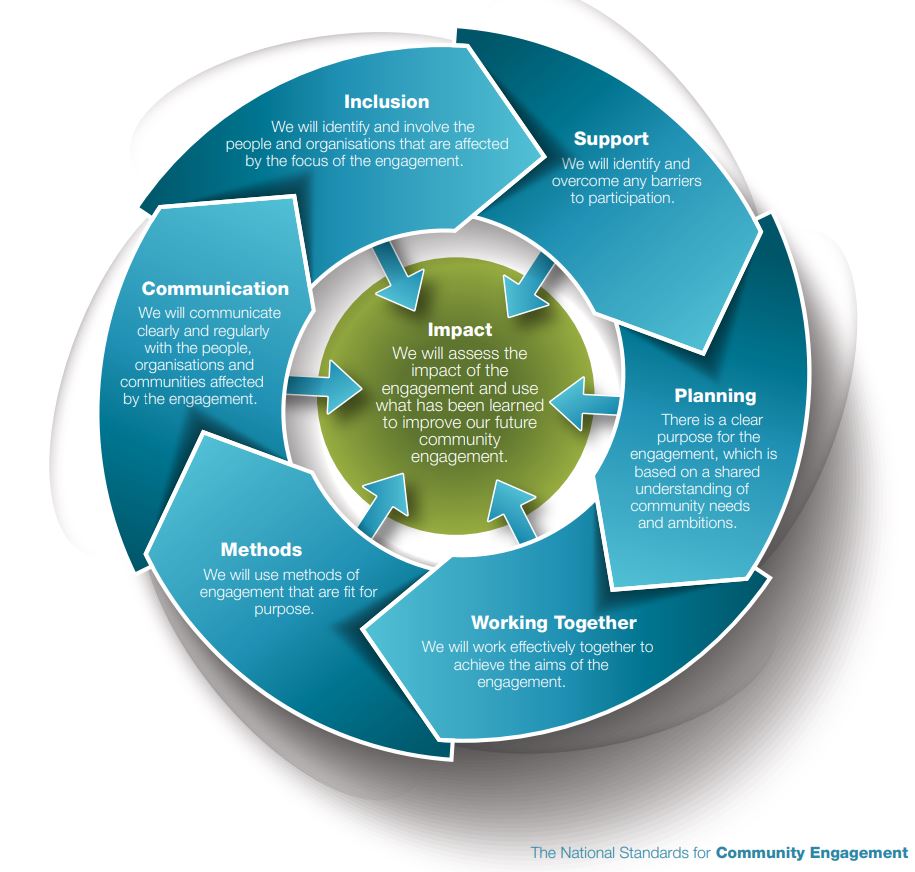Participation
Scotland’s National Standards for Community Engagement
June 29, 2022 by Jen Swan 1 Comment | Category Our work
We invited Paul Nelis from the Scottish Community Development Centre (SCDC) to explore the impact of Scotland’s National Standards for Community Engagement.
The National Standards for Community Engagement are supported by Scottish Government, find out more about community empowerment policy on our policy pages.
Happy 17th birthday to the National Standards for Community Engagement (NSfCE), we’ve watched you spread your wings to influence policy and practice with pride. We’re pleased to say that your 7 simple guiding principles have gone some way to improving the quality of community engagement in Scotland.
The NSfCE are good-practice community engagement standards which were commissioned by the Scottish Government back in 2003. They are designed to improve and guide good practice in community engagement. They were co-produced with engagement practitioners in communities to plan and evaluate engagement practice.
It has taken a long time but the quality of community engagement has improved enormously as a result of the Standards and the influence they have has on policy and practice. It’s helpful to remind ourselves where the Standards came from, how they are used now and to identify some of the challenges for the future.
Then…
The NSfCE were introduced to tackle the issues which had undermined engagement practice for decades. Communities told Government that community engagement practice:
- was a ‘tick box’ exercise – with decisions made before the engagement took place
- agencies used methods of engagement that favoured the loudest voices with no real effort to reach less heard voices e.g. young mothers or BAME communities
- it was characterised by poor communication and planning and little clarity on how communities could influence decisions
- poor feedback regarding what decisions had been taken following community meetings.
The NSfCE were developed by community engagement practitioners at focus groups from the Shetlands to the Borders. They make clear that good community engagement is a way to help people and community groups to work together with public and private organisations on the priorities that are important to their community. Working together can make the community itself stronger and helps to develop better service that meet people’s needs.
The Standards were launched in 2005 with the endorsement of agencies and communities across Scotland. They were refreshed in 2016 to reflect developments like social media in engagement, community groups engaging with their own communities and a focus on the impact of engagement.
Now…
I would argue that the NSfCE are contributing to better quality community engagement practice in Scotland. But don’t take my word for it! SCDC’s survey of community engagement practitioners found that 68% of respondents said that community engagement practice had improved in Scotland over the last 10 years. Some comments:
“…over the last 10 years the Scottish Government has placed a greater emphasis on engaging local people in the decision-making process and as a result more professionals are using the Standards for community engagement to ensure effective outcomes.” (Community Capacity Building Worker – Fife Council)
“There is now more engagement with the public than ever, and in a meaningful way.” (Development Worker – Community Development Trust)
Of course, the Standards alone have not improved engagement practice in Scotland. We are seeing increased legislation which brings to the foreground the importance of good community engagement in many areas of public policy and services. The most prominent of these is the Community Empowerment Act (2015) but also includes new legislation regarding Children and Young People’s Services, Health and Social Care, Community Justice Services and physical and land use planning.
Going forward
The NSfCE have already made a significant impact but have even more potential to have a positive impact. If we choose to build on our success, we need to:
- promote them to a new generation of community workers and service managers in the statutory, community and voluntary sectors so they can put them into everyday practice
- share the best methods of engagement so that new and existing community workers will have the knowledge, confidence and skills to engage and build stronger communities
- most importantly, the Standards continue to support legislation and policy which promotes equality and ensures that those people overlooked in the past are better regarded in the future
The Standard are supported by free online planning and recording software called VOiCE that assists individuals, organisations and partnerships to design and deliver effective community engagement. VOiCE provides an online platform to plan and evaluate community engagement activity. It is currently being used by individuals and organisations to record and improve their engagement activities. Moray Council’s Communities Team are using the system to bring all of their community engagement activity together in one space to enable them to plan consistently and share activities across the Authority. The system enables the team to:
- develop plans that relate to their community engagement purpose
- monitor progress in implementing the plan
- evaluate the process and outcomes
- learn lessons for future activity
Learn more about the Standards and VOiCE
Many Scottish organisations have endorsed the Standards.
Have you used the National Standards for Community Engagement in your work? If so, we’d love to hear from you in the comments.
Scottish Government participation and engagement
Interested in receiving updates and insights into our work to embed good participation and engagement practices across the Scottish Government? Subscribe to the Scottish Government’s participation blog and follow us on twitter @scotgovengage

Thank you for sharing. It is very informative and helpful for people with community participation .